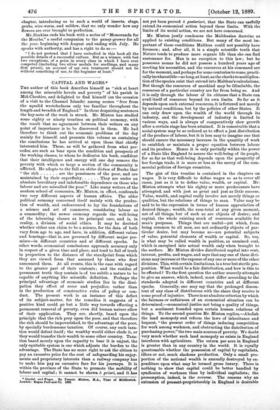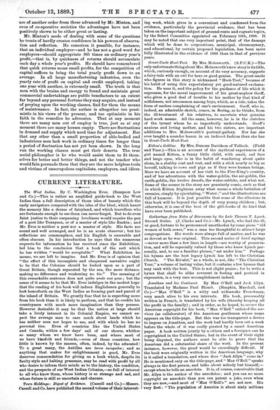CAPITAL AND WAGES.* THE author of this book describes himself
as "sick at heart among the miserable hovels and poverty" of his parish in Mid-Cheshire, and delighted to find himself (on the occasion of a visit to the Channel Islands) among scenes "free from the squalid wretchedness only too familiar throughout the length and breadth of England." In these despairing sentences the key-note of the work is struck. Mr. Minton has studied some eighty or ninety treatises on political economy, with the result that no agreement between their writers on any point of importance is to be discovered in them. He had therefore to think out the economic problems of the day mainly for himself, and presents this volume as containing the conclusions he has arrived at upon those that chiefly interested him. These, as will be gathered from what pre- cedes, are such as bear upon the condition and prospects of the working classes, to whom he dedicates his book, confident that their intelligence and energy will one day remove the poverty with which so large a section of the community is afflicted. He adopts to the full an obiter dictum of Burke that " the rich are the pensioners of the poor, and are maintained by their superfluity They are under an
absolute hereditary and indefensible dependence on those who labour and are miscalled the poor." Like many writers of the modern school of economics, Mr. Minton, in effect, confounds two very different aspects of human affairs. The older political economy concerned itself mainly with the produc- tion of wealth, and endeavoured to lay the foundations of a science and art of commerce, considering labour as a commodity; the newer economy regards the well-being of the labouring classes as its principal care, and is, in reality, a division of social ethics. It may be doubted whether either can claim to be a science, for the data of both vary from age to age, and have, in addition, different values and bearings—that is, are governed by different major pre- mises—in different countries and at different epochs. In other words, economical conclusions approach accuracy only in respect of a given time and place, and tend to fail of truth in proportion to the distance of the standpoint from which they are viewed from that assumed by those who first announced them. At all events, this is the case with regard to the greater part of their contents ; and the residue of permanent truth they contain is of too subtle a nature to be capable of anything like scientific definition. Perhaps the principal advantage of economic studies lies in the dissi- pation they effect of error and prejudice, rather than in the production of constructive rules of policy or con- duct. The present work is an instance of this defect of its subject-matter, for the remedies it suggests of a positive kind could go but a little way towards effecting a permanent removal of poverty, even did human nature allow of their application. They are, shortly, based upon the principle that the rich prey upon the poor, and that therefore -the rich should be impoverished, to the advantage of the poor, by specially burdensome taxation. Of course, any such taxa- tion would defeat itself; the wealthy would either elude it, or they would transfer their wealth to some other country. Taxa- tion based merely upon the capacity to bear it is unjust, the -only equitable system is one which adjusts the burden to the advantage. The State has no more right to ask the citizen to pay an excessive price for the cost of safeguarding his enjoy- ments and proprietary interests than a railway company has to make him pay an excessive fare for his journeys. It is within the province of the State to promote the mobility of labour and capital ; it cannot be shown a priori, and it has • Capital and Wages. By Francis Minton, ILA., Vicar of IdIddlowloh. London : Kagan Paul and Co. 1889. not, yet been proved a posteriori, that the State can usefully extend its economical action beyond these limits. With the limits of its social action, we are not here concerned.
Mr. Minton justly condemns the Malthusian doctrine as applied to existing conditions. But many of the most im- portant of these conditions Malthus could not possibly have foreseen; and, after all, it is a simple scientific truth that Nature tends to produce more organic life than she can find sustenance for. Man is no exception to this law ; but he possesses means he did not possess a hundred years ago of meeting his necessities, and the resources at his command are for the moment, and perhaps for some centuries to come, practi- cally inexhaustible—so long, at least, as the checks to multiplica- tion of the species exist that extend into Malthus's calculations. But though the resources of mankind may be illimitable, the resources of a particular country are far from being so. And it is only through the labour of its citizens that a State can avail itself of resources beyond its own limits. So far as it depends upon such external resources, it is fettered not merely by natural conditions, but by the policies of other States. It can only draw upon the wealth of the world through its industry, and the development of industry is limited in various ways, and is always of comparatively slow growth after a certain stage has been attained. It is conceivable that a social system may be so ordered as to effect a just distribution of the produce of labour, but it is less easy to imagine one that should ensure the necessary increase in the quantity of work to establish or maintain a proper equation between labour and its produce. Hence it is only partially within the power of a State like England to assure the well-being of its people, for so far as that well-being depends upon the prosperity of her foreign trade, it is more or less at the mercy of the com- mercial policies of foreign countries.
The gist of this treatise is contained in the chapters on wages. It is very difficult to define wages so as to cover all cases, just as it is to define value, wealth, or capital. Mr. Minton attempts what his eighty or more predecessors have attempted, and with just as great and just as little success. Value, wealth, and capital really involve not merely things or qualities, but the relations of things to man. Value may be said to be the expression in terms of human appreciation of desired things ; wealth, the sum-total at any given moment, not of all things, but of such as are objects of desire; and capital, the whole existing stock of resources available for man's purposes. Things that are useful—yet which, from being common to all men, are not ordinarily objects of par- ticular desire, but may become so—are potential subjects of value, potential elements of wealth or capital. So, too, is what may be called wealth in position, as unmined coal, which is energised into actual wealth only when brought to the surface. Mr. Minton divides distributed capital into rent, interest, profits, and wages, and says that any one of these divi- sions may increase at the expense of any one or more of the other divisions. This, with certain limitations, is a true but sterile pro- position. What would be a fair distribution, and how is this to be effected? To the first question the author scarcely attempts to give an answer, which, indeed, must differ according to the standards adopted in different countries and at different epochs. Generally, one may say that the prolonged discon- tent of any class of distributees with the share they receive is some proof of injustice. There is no absolute criterion by which the fairness or unfairness of an economical situation can be determined,—economical justice not being a quality of things, but a sentiment founded upon certain human relations of things. To the second question Mr. Minton replies,—Abolish the land monopoly and reform the laws of inheritance and bequest, "the present order of things inducing competition for work among workmen, and obstructing the distribution of purchasing power," the two main sources of poverty. We doubt very much whether such land monopoly as exists in England interferes with agriculture. The return per acre in England is greater than in any country in the world. It is equally questionable whether the possession of capital by capitalists, idlers or not, much slackens production. Only a small pro- portion of the national wealth is annually destroyed by ex- penditure upon what may be termed gross luxury. There is nothing to show that capital could be better handled by syndicates of workmen than by individual capitalists; the presumption, indeed, is the reverse. The reasons why an extension of peasant-proprietorship in England is desirable
are of another order from those advanced by Mr. Minton, and even of co-operative societies the advantages have not been positively shown to be either great or lasting.
Mr. Minton's mode of dealing with some of the questions he treats of hardly creates confidence in his powers of observa- tion and reflection. He conceives it possible, for instance, that an individual employer—and he has not a good word for employers—should appropriate 365 times an ordinary year's profit,—that is, by quickness of returns should accumulate each day a whole year's profits. He should have remembered that quick returns mean small profits, for the competition of capital suffices to bring the total yearly profit down to an average. In all large manufacturing industries, even the yearly rate of profit on capital and credit employed, taking one year with another, is extremely small. The truth is that men with the brains and energy to found and maintain great commercial undertakings are public benefactors to an extent far beyond any personal fortune they may Require, and instead of preying upon the working classes, find for them the means of maintenance. In fact, the author is altogether too pessi- mistic in his views of the present, and too optimistic in his faith in the remedies he advocates. That at any moment there are many men out of employ is true, just as at any moment there are many houses empty. There are fluctuations in demand and supply which need time for adjustment. But that any other than a small proportion of able-bodied and industrious men lack work in ordinary times for longer than a period of fluctuation has not yet been shown. In the long run the working classes must get their deserts. The true social philosopher is he who would assist them to fit them- selves for better and better things, and not the teacher who would fain persuade them that they are the mere helpless tools and victims of unscrupulous capitalists, employers, and idlers.



















































 Previous page
Previous page